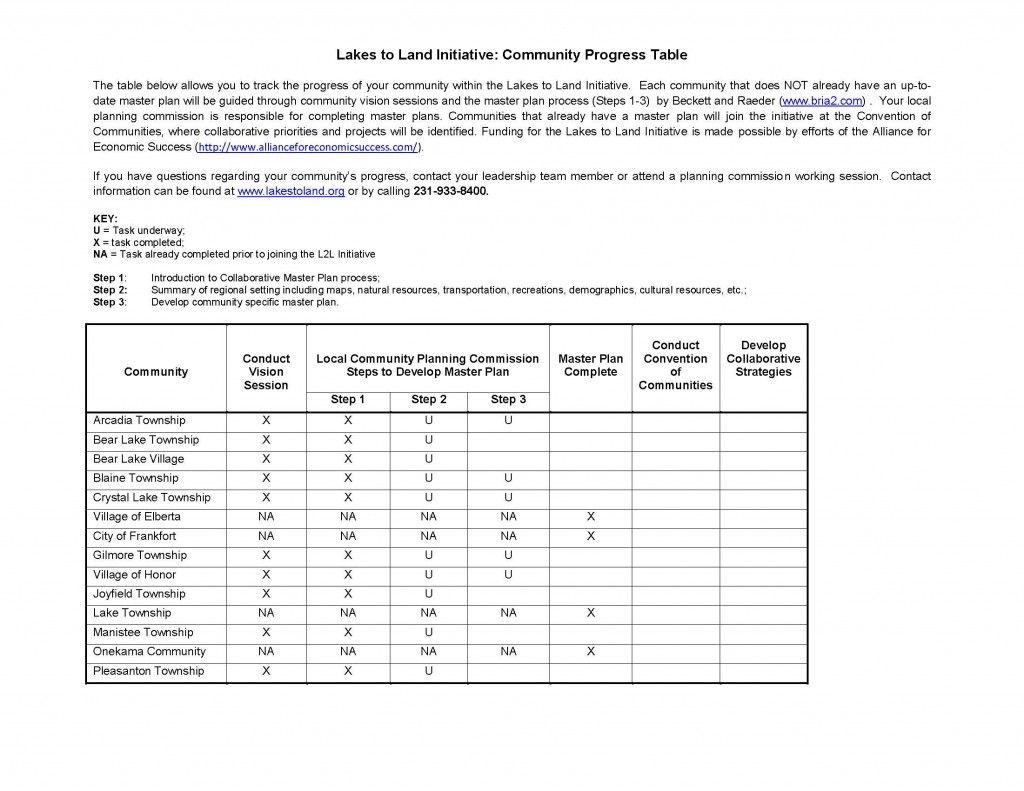It’s been awhile since you heard from us! Since the visioning sessions drew to a close, a quiet has descended over the planning population in the Lakes to Land region – but it’s not inaction, it’s just that you’re out of range of our clacking keyboards.
Planning commissioners in Crystal Lake, Blaine, Gilmore, Arcadia, and Pleasanton Townships have all been working hard. They’ve analyzed maps and demographics, discussed the vision session results, conducted an existing land use survey, and are in the process of finalizing goals and strategies. The Village of Honor has concluded and analyzed its own independently conducted survey and analyzed demographics and maps. And now Joyfield, Manistee, and Bear Lake Townships and the Village of Bear Lake are up to bat to begin their efforts.
We’ve launched a new feature on the site to help you keep tabs on everyone: the Community Progress Table (click to enlarge).
It’s a matrix of the participating communities and the steps to be completed, so that you can see where your community is in the process and follow along as we move through it together. You will find updates under “L2L Documents” on the sidebar to the right.
In addition to creating this terrific tool, Leadership Team member Monica Schultz (Crystal Lake Township) conducted an interview with Sam Passmore of the Charles Stewart Mott Foundation, a principal funder of the Initiative. The interview was undertaken with the aim of helping our communities gain a better understanding why such a major foundation would financially invest in a project like this one.
An interview with Sam Passmore of Charles Stewart Mott Foundation
The Lakes to Land (L2L) Regional Initiative received a big boost early in 2012 with a grant of $65,000 from the Charles Stewart Mott Foundation. To better understand Mott’s interest in this project, Monica Schultz spoke with Sam Passmore, Director of Environmental Programs at Mott and program officer for this grant.
First of all, what’s a program officer?
A program’s officer’s role is to screen requests for funding that are submitted to the foundation. The program officer provides recommendations to the people who make the final decision on whether to fund or not. Basically, in the case of the grant provided to L2L, your proposal was in line with Mott’s interests.
How did the Lakes to Land Initiative come to your attention?
It’s not unusual for projects to be brought to our attention by the network of people who we’ve gotten to know through the years. The project was brought to our attention by Tim Ervin of the Alliance for Economic Success, whom we know well.
So what are Mott’s interests in this particular project?
Mott is already involved in funding projects in your geographic area – we helped the Grand Traverse Regional Land Conservancy protect the Arcadia Dunes property. We’re the largest private donor for that project. We’re really very proud of that and pleased to be able to support it. That decision established our interest in that particular landscape.
We view the L2L project as a logical extension of our interest in your area. Due to the community engagement around the wind energy issue last year, there seems to be a broad understanding that it would be helpful for all jurisdictions in the area to have a shared vision of what the future should look like. In this way, when other proposals and ideas come down the pike, the region is less in a reactive mode and more able to express the community’s vision for the area.
What else interested you?
The Mott Foundation also supports the idea of inter-jurisdictional cooperation and regional collaboration. We think that working across jurisdictional lines is of great value in other areas of our grant making. So here’s this great opportunity to support a model project of regional cooperation and collaboration in our own backyard. Of course, we were interested!
So our past interest in your region, the recent involvement and engagement of the community, and the inter-jurisdictional nature of the project made it an easy decision to support the project.
Do you have a particular outcome you’re looking for?
We really don’t have a specific outcome that we’re hoping to see, or prescription that we hope the community adopts. We understand that whatever happens needs to be an expression of what the people who live there want. That’s the only way it will work in the longrun.
Are you hoping this becomes a model for other projects?
This tends to happen organically. If you’re successful, word will get out, and other communities will want to learn from your successes.

